Summit Conference 2021 was full of incredible speakers with many key takeaways. Every year, we invite talented individuals to share their expertise and knowledge. We had a hard time narrowing it down, but here are a few highlights from the event held at Deer Valley.
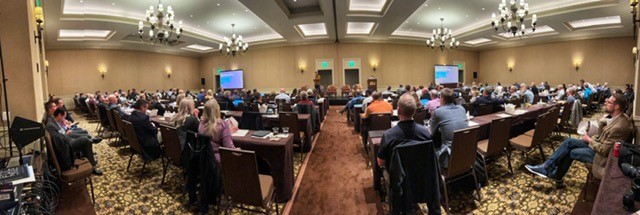
Key Takeaways from Summit Conference 2021
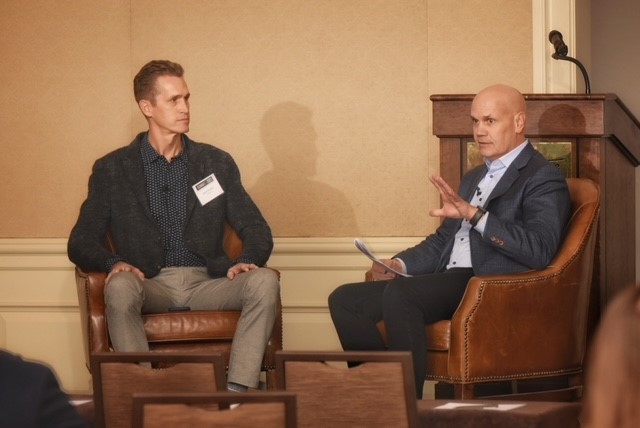
To kick off Summit Conference 2021, Diversified President Spence Hoole had a fireside chat with Priceline CEO Brett Keller.
Brett Keller, CEO, Priceline: Building a Legacy of Disruption
He shared his experience running a multibillion-dollar company during the pandemic. Keller said, “Obviously with the pandemic the one business you don’t want to be in is travel. Luckily, travel is highly resilient. People want to travel and will find out a way to do that.”
He said once the pandemic hit, he had two jobs –
- Preserve capital and cut variable expenses
- Convince the staff to stay
He did the second by creating a daily communication cycle with everyone at the company. Keller said the reality is inflation is going up and so is compensation. You’re either going to pay it or you’re going to see your talent walking out the door.
“The one thing employees today hate more than anything is not being in the know.”
– Brett Keller
Natalie Gochnour: The Politics of Economics
Next up at Summit Conference was well-known Utahn Natalie Gochnour. Gochnour serves as an associate dean in the David Eccles School of Business and director of the Kem C. Gardner Policy Institute at the University of Utah. She also serves as the chief economist for the Salt Lake Chamber. In these roles, she helps connect the Eccles School with the broader business community and shares applied economic and business research.
Gochnour began her presentation by talking about wages for full-time full-year US male workers. She showed the wage gap and disparity in men vs. women and discussed the number of women who have left the workforce since the pandemic started. She talked about how it’s so important because it starts to characterize the biggest challenge we’re facing which is the notion that not everyone is succeeding.
“The greatest challenge of our time is how do we maximize the benefits, while mitigating the costs of a world dominated by technology.”
– Natalie Gochnour
She suggested we invest in physical capital, invest in people, and invest in institutions and our community. One recommendation was to increase the minimum wage. Gochnour said, “I want to see us invest in education so they have the skills to compete in the marketplace. It’s an incredible investment in the future. If I want to navigate 2022 well, I want to invest in people.”
Breakout 2: Board Diversity, Talent Composition, and Succession Planning
Moderator – Mark Bonham, Partner, Stoel Rives
Panelist – Cydni Rogers Tetro, CEO, Brandless
Panelist – Brad Rencher, CEO, BambooHR
Panelist – Cash Monestine, Director of Sales, Evident Systems
The panelists had a lively conversation about board diversity. They talked about creating a board that genuinely likes to spend time together and works well together. A point of discussion was not allowing someone on the board to be the “token” person of color or the “token” woman. It’s been proven that boards function better when there is more than one woman on them.
Cydni Tetro shared her own personal vision for getting more women on boards and how she is doing that through the Women in Tech Council, which she founded. Brad Rencher from Bamboo HR shared his own journey to CEO and how he came from a private equity background. They all discussed the importance of having a diverse board with a variety of skill sets and expertise.
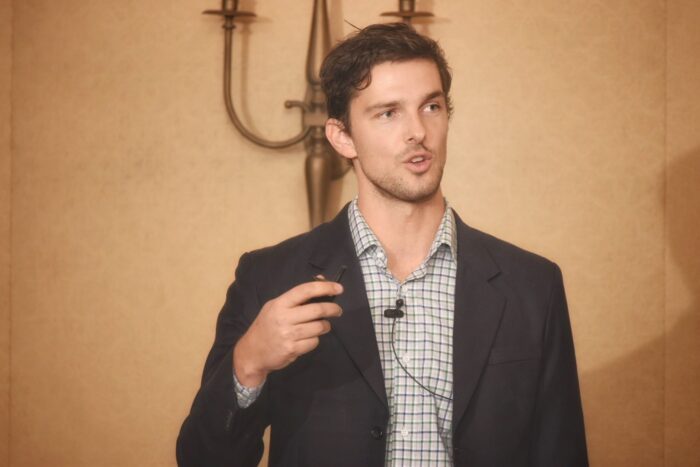
Spencer Christensen and Channing Hancock: Accelerating Culture: Keeping up with Millennials, Movements, and Memes
This husband and wife duo gives us the real story of what it’s really like to work for a couple of high-profile tech startups in Silicon Valley.
They kicked things off by introducing TikTokers. They talked about the Tik Tok generation and how and why they matter. If you were to go into a research center, there is a lot of subtlety in the age differences we are currently seeing in micro generations. Even though they have a minority of the spending power, they don’t have a lot of money, but they like to spend it. They discussed these younger generations in three categories: people, customers, and co-workers.
Everything is accelerating. The type of adoption that is currently happening is expected to accelerate. We expect to see data consumption go up. The amount of information coming at us daily is increasing.
You can also look at the consumption of caffeine and how it has skyrocketed in recent years. Christensen commented, “Red Bull gives you wings, Bang gives you a rocket ship. Coca-cola has 30-35 milligrams of caffeine, Red Bull has 80 milligrams of caffeine. One can of Bang has 300 milligrams of caffeine.” People are exhausted, but they’re trying to fly through content faster. The longevity of content is not there anymore. Memes used to trend for a while. No longer. Twitter trending topics are another significant example of attention spans shortening because of the rush of constant content.
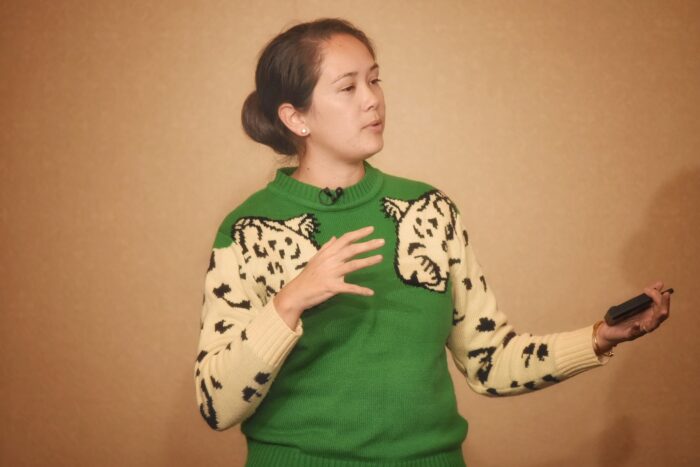
The institutions that have been there timelessly for past generations have really let millennials down. For example, government, big business, etc. In 1980, the median earner in the US became less likely to earn more than their parents. These generations have a lot of displeasure towards institutions.
They ended their presentation by stating that although yes, there is an audience that prefers short, quick content, people are still thirsting for something that is deep and meaningful in the content they engage with.
Paul Godfrey BYU Marriott School of Business, Business Strategy Professor: Ethics in Business – The DNA of ESG
Godfrey is a professor at the BYU Marriott School of Business and works with students daily. He said while they’re in school, we throw them into a consulting firm. They work with real clients and find real solutions. He claimed they do some of the best work he’s seen.
Godfrey stated, “ESG is now ‘permission to play.” He talked about how the CEO of Delta never learned in business school that he would have to take a stand at work on issues that are important. Concern for the environment, society, and good governance is no longer aspirational value or a source of competitive advantage.
Privacy / Cybersecurity Panel – Tomorrow’s Trends
Tim Burke, Director Cyber Risk, IMA
Panelist – Dan Hansen, Managing Director, Protiviti
Panelist – Marty Carpenter, President 24 Nine
Panelist – Jennifer Archie, Partner, Latham & Watkins
The panel talked about what is currently happening in the cyber security world. They went through real scenarios that they are seeing. A lot of time was spent discussing the pros and cons of paying an intermediary to negotiate with hackers. In today’s world, you’re going to go through the intermediary, and they test the key and you don’t move any money until someone tests the key. These professional intermediaries don’t get made fools of very often.
Intermediaries have a broad view of what is going on in the hacking world. When you work with the intermediaries, they are keeping extremely detailed statistics, gang by gang. They will be able to tell you how often they’ve delivered the key. These details help you make decisions on how to proceed when you go through a data breach.
“You’re going to get experts, they will bring you data, you will make a data-based decision.”
– Marty Carpenter
Speaking to directors and officers, they said the biggest mistake you could make is to not prepare and know these services are out there. The biggest issue that we have seen is that it is similar to phishing. Someone will click and the adversaries are not clear who they are extorting. We have seen once they’ve realized they’ve got gold, they will dramatically increase the demand.
When referring to negotiating with the hackers, the statistics are overwhelming that you get what you bargain for. There is a false narrative out there that if you pay you’re setting yourself up again. The panelists all agreed you are not going to be vulnerable to that attack again if you take proper steps with experienced experts.
The most important takeaway from the session – do a cybersecurity review. Ask yourself a few simple questions. What is the technology you’re using to do your backups, are you separating those backups? What if the hackers start encrypting things? Spend a lot of time until you understand your data. Finally, find out what would happen if you had a ransomware event.
Michael Hartnett, Bank of America, Chief Investment Strategist: Macro-Economic Forces, Supply Chain Challenges and Global Disruption – A Primer for Boards
Hartnett began his discussion by noting that we are seeing the lowest interest rates in 5,000 years. He then went on to explain that the market cap of Apple, Amazon, Facebook, Google, Microsoft, Netflix, and Tesla is higher than the Central bank liquidity.
Hartnett illustrated how high inflation currently is. Core US inflation annualized past 3M has not been at the current high since 1982. He then went on to explain many statistics that have changed during the pandemic, including reopening vs lockdown.
He showed Themes for the 2010s vs 2020s:
The 2010s: 1%, Wall Street, Maximizing wealth, Deregulation, Bitcoin, Deflation
The 2020s: 99%, Main Street, Maximizing health, Intervention, Fedcoin, Inflation
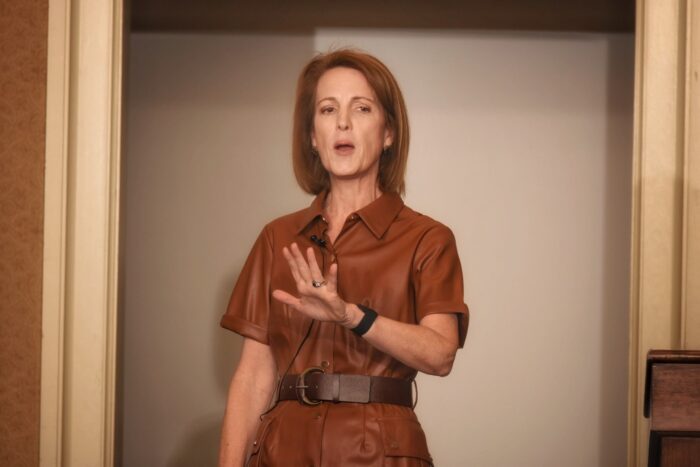
Whitney Johnson, Smart Growth: How to Grow Your People to Grow Your Company
Johnson used a wave metaphor to communicate her message of finding the sweet spot. When you throw people into challenging jobs that they’re not completely prepared for, you need to make sure they have a great support team.
As people develop competence in a new domain of expertise, they move along an S Curve: Growth is slow and effortful at the outset or launch point. It then progresses rapidly as people acquire new skills in a stretch known as the sweet spot. At the peak is mastery, when work becomes easier, but the curve flattens. Understanding where your employees are on this S Curve of Learning will help you coach them appropriately, craft thoughtful succession plans, and build a team with diverse but complementary strengths.
Johnson has a new book out now, Smart Growth: How to Grow Your People to Grow Your Company.
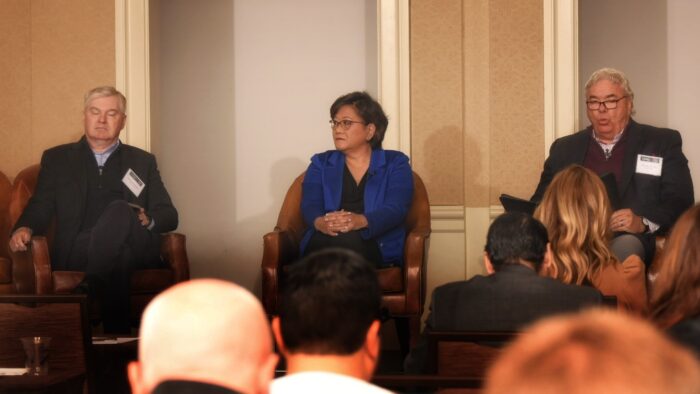
NACD Panel – Technology as an Accelerator and Its Impact on Boards
Moderator – Robert C. Gross, President NACD Utah, Summit 2021 Co-Chair
Panelist – Toby Redshaw, CEO of Verus Advisory
Panelist – Anna C. Catalano, Director, Willis Towers Watson
We are currently in the 4th Industrial Revolution. It is going to change the world dramatically. The difference is this one is purely technological, and it will take 6-8 years, whereas the others took decades.
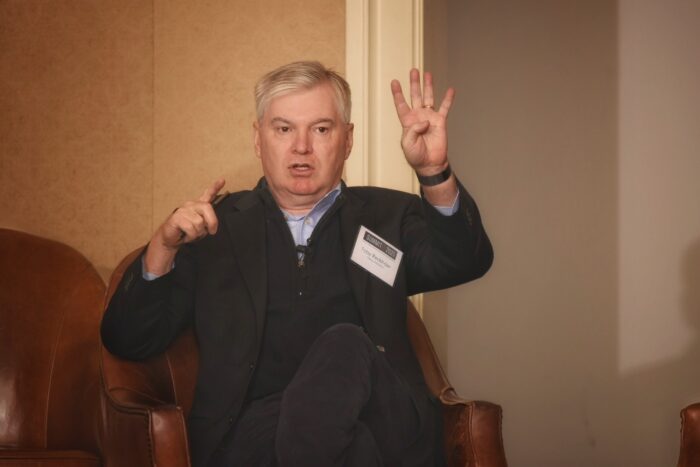
They spoke about the emergence of 5G and how transformational it is to have a super-fast, supercomputer in your pocket. They posed the question, “How is technology going to be changing our strategy going forward?” 80% of CEOs believe if they want to transform companies, they need to transform themselves.
Capital Markets Panel: SPACs – De-SPACs – IPOs
Moderator – Deemie Nishimura, VP, Global Capital Markets, DFIN
Panelist – Elizabeth Hocker, Managing Director, Nasdaq
Panelist – Tanner Ainge, Managing Partner, Banner Ventures
Panelist – Drew Capurro, Partner, Latham & Watkins
IPOs had their busiest year ever. This year there were 965 IPOs (558 SPACs and 6 direct listings). There are now multiple paths of going public, how do you know which one is right for your company? When speaking about Utah, Elizabeth Hocker said, “Utah had 9 IPOs this year and 3 SPACs. Utah has 47 public companies.”
Tanner Ainge spoke about things to consider when doing a SPAC.
6 things to consider when deciding to do a SPAC:
- Time to market/speed
- Certainty of price
- The ability to structure the deal
- Greater ability to tell your story
- Ability to combine multiple companies
- Ability to wrap your story and credibility into your SPAC
“The PR activities you have leading up to your listing day are super important. You want to celebrate it. It’s an opportunity to have the world stage right there. Make sure you’ve got all of the eyeballs on you.”
– Elizabeth Hocker
Clif Smith, Ernst and Young LLP, EY Mindfulness Leader: Mindful Leadership in a Modern World
Smith began his thoughts by saying, “When you can face that fear that you feel so deeply and move through it, there’s really no goal out of reach.”
He shared his life story, beginning with being raised by a single mother in a trailer and having very little schooling to being accepted at Harvard University.
“Our comfort zones are where dreams go to die because our brains are designed to keep us safe.”
– Clif Smith
Mindfulness helps us uncover and transcend our self-limiting beliefs. Mindfulness is the ability to pay attention to the present moment without getting too caught up in our automatic thoughts and judgments. He said on average, 47% of the time our minds are not in the present. He shared his STOP acronym to help in these moments:
S – top
T – ake a break
O – bserve
P – ose & Proceed
Smith wrote the book, Mindfulness Without the Bells and Beads: Unlocking Exceptional Performance, Leadership, and Well-being for Working Professionals.
Gary Crittenden HGGC, Executive Director: The Role of the Board in Setting Company Strategy
He shared his expertise in company strategy and his experience being the CEO of Citi Bank during the financial crisis. He shared insights from his own extensive board experience and what he has seen work in the past.
Jeremy Andrus, CEO of Traeger: Lessons from Building the Traegerhood
He took the audience through his career and told everyone how he ended up at Traeger. He spoke about how horrible the company culture was when he started at Traeger. How he tried several ways to change it, but in the end, let a majority of the employees go. He came to work the next day and saw that the disgruntled employees had lit one of the Traeger trucks on fire. “I look back and I learned a lot from that experience about leadership, business, strategy, culture, organizational behavior, but one of the lessons I’ve been thinking about recently is how deep that moment felt. How the despair I felt just saying this is the worst thing I’ve ever had to deal with. But, fortunately, I didn’t quit.”
He ended his speech by sharing more information about how the company pivoted during the pandemic and has grown into a very loyal community. Andrus said his current favorite part of work is the mentoring opportunities he has.
Key Takeaways from Summit Conference 2021
We are so grateful to all of the speakers and panelists who attended the conference this year. It was an exceptional event and it was wonderful to be together in person for the event. We are already looking forward to next year! If you want more information about Diversified, go here.

